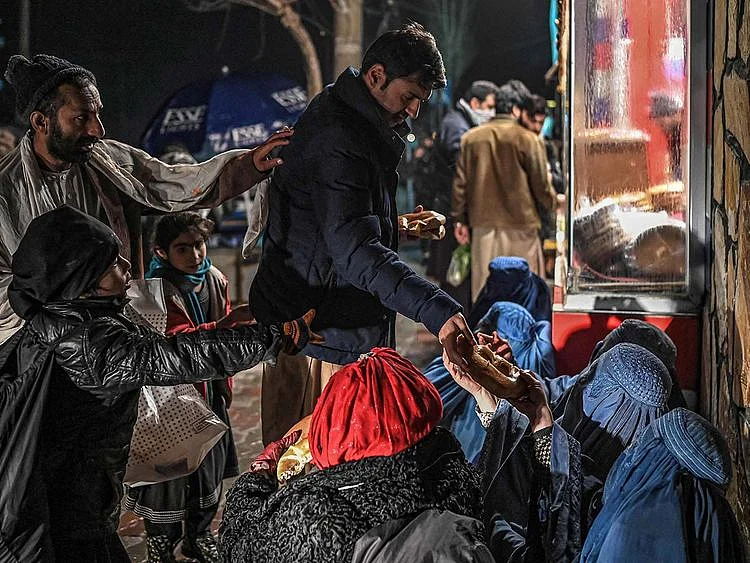The top and heart-wrenching news story from Afghanistan this week was about how an infant boy handed in desperation to a soldier across an airport wall in the chaos of the American evacuation on Aug. 19 — as thousands of Afghans rushed to leave their country — was reunited with his family in Kabul.
The boy, named Suhail Ahmadi, who was merely two months old when he went missing, had been picked up by a taxi driver, a married man in his late twenties, who took him home to raise as his own son.
Praise the Lord. All’s well that ends well.
But the top and, pardon me, the much more heart-wrenching news story was the one that had been playing out across the whole of Afghanistan for months, impacting, and ever so tragically, the lives of virtually every Afghan living there. And what makes the story all the more distressing is that it seemed to pass largely unnoticed by the rest of the world.
In the wake of the US’s recent hasty withdrawal, Afghanistan soon became the kind of country we didn’t normally think much about, until we have to. Well, now we have to.
Folks, Afghanistan today represents the world’s largest humanitarian crisis. The United Nations Development Programme estimates that by the middle of this year, the country will — not potentially could but actually will — face extreme levels of mass hunger, the kind that will leave no Afghan untouched, no one man, woman and child, irrespective of their economic status, ethnic background and social class.
Food insecurity
Already, as we speak, 92 per cent of Afghans are experiencing what social scientists and UN officials politely call “food insecurity”, among them pregnant women unable to carry their babies to full term and malnourished mothers unable to breast-feed. They could be found crowded outside now defunct health care centers everywhere. You see, of the country’s once running 32,000 health care centers, only 17 per cent are today functional. And even in these, medicine is woefully in short supply.
So, in the name of mercy, what to do? What is the one and only thing to do here that will save the day and bring relief to the people of this tormented land? The one thing that will rescue Afghans from irremediable suffering, as the country’s notoriously harsh, brutally cold winter continues, especially in its northern parts, where piercing winds blow in the valleys and heavy snow cuts off for months the tens of thousands of villagers who live there?
The one and only thing that’ll do it here is simple. President Biden should allow the release of the $9 billion in frozen Afghan government funds to the non-governmental humanitarian organisations still active in the country, enabling them to provide Afghans that much needed, direct relief.
This is not about whether we love or hate the Tabian. It is not about whether we had supported or condemned the American intervention in Afghanistan. And it not about the need to raise critical questions related to what went wrong — so drastically, so wantonly wrong — with the 20-year-long US experiment of nation-building in that remote, enigmatic, landlocked land, in which American taxpayers were made to invest $2.8 trillion of their hard-earned money. This is all water under the bridge now, but hopefully it will be a lesson to learn from about how nation building, from the top down, by a big power hailing from another culture and another continent, is a fool’s errand, one that carries within it the germ of preordained failure.
It is, however, about how hunger — and soon, outright famine — is stalking Afghanistan. And about reflecting on how no people, whether in Afghanistan or elsewhere, who endure food insecurity on account of war, flooding, disease, drought, political strife, revolution and the rest of it, should go hungry in an age of plenty.
And ours is an age of plenty because we know that the world produces enough food to feed all the 7.5 billion people living in it. Thus, no one people in this small global village we all inhabit together should ever have to go hungry. That is a great challenge facing us today. And in Afghanistan it is not just facing us but staring at us, — and accusingly so.
Mr. Biden, tear down that wall — the one standing in the way of desperately needed relief to the people of Afghanistan.
And, heck, it’s only a lousy nine billion bucks, for heaven’s sake! Chump change for a big power obsessed with its nation-building hobby.
— Fawaz Turki is a journalist, academic and author based in Washington. He is the author of The Disinherited: Journal of a Palestinian Exile
Sign up for the Daily Briefing
Get the latest news and updates straight to your inbox
Network Links
GN StoreDownload our app
© Al Nisr Publishing LLC 2026. All rights reserved.
